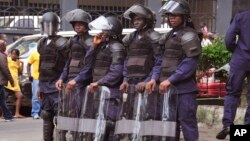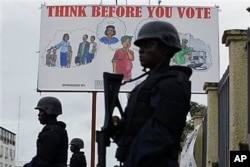The U.N. Mission in Liberia said everything is set to handover security matters to the Liberian government. The government will assume full responsibility of security by June 30, the deadline for the pullout of the U.N. peacekeeping mission, many challenges remain.
For the first time since Liberia’s civil war ended in 2003, the country will be entirely in charge of its own security.
Security transition plan
The U.N. Peacekeeping Mission, known as UNMIL, said it is confident the Liberian government will be up to the task after the pullout, but some key issues need to be addressed within the next five months.
UNMIL Chief of Public Information Russell Geekie said in order for the transition plan to succeed, the government must prioritize the security sector and enact several rule-of-law reforms before the handover deadline.
"I am thinking of the Fire Arms and Ammunition Act, thinking of the Bureau of Immigration and Naturalization Act. These are bills now, I should say. And of course the Police Act, Domestic Violence. This is a critical part of security that we would love to see ... We hope to see progress on that very soon,” he said.
“[And] again, security is a holistic approach. We [are] thinking of decentralization. We thinking of more progress on reconciliation."
The Liberia National Police said they plan to train an additional 5,000 officers. But beyond these measures by the government and police, community support is also vital to the transition plan.
Building confidence in police
Many Liberians say they have no confidence in the police, and relations between security forces and civilians remain strained.
One local business woman, who requested not to be identified, told VOA “Where are we going to be tomorrow? When something happens and you carry it to [the] police station, [even] when you are right, [if] you do not have money, [the] police people will free the people that wronged you. The people, we are going [to] worry. [The] police people, they are not going to guide us,” she stated.
Police spokesman Sam Collins said police during past regimes have been labeled "unfriendly", but the force is doing its best to improve. “We want you to have confidence in the Liberia National Police. Do we have bad police officers?
Yes, we do have bad police officers, but we are weeding them out of the police on a daily basis ... We have suspended people, we have sacked people, we have sent officers for prosecution. Some of them are in jail for 10 to 15 years for getting involved in acts unbecoming of police officers,” Collins explained. “All those things we doing is to redeem the image of the police.”
Collins said there is an anonymous hotline number that Liberians can call or text to report any wrongdoing or corruption by the police. An investigation will “immediately” follow any complaints, he said.
UNMIL said it will maintain a force of about 1,200 police and 600 security personnel. These personnel would only support national security agencies in an extreme situation, one that threatened a strategic reversal of the great strides Liberia and its partners have made on peace and security during the past 12 years.
But all other security tasks being performed by UNMIL, such as guard duty at the president’s residence, will be handed over





